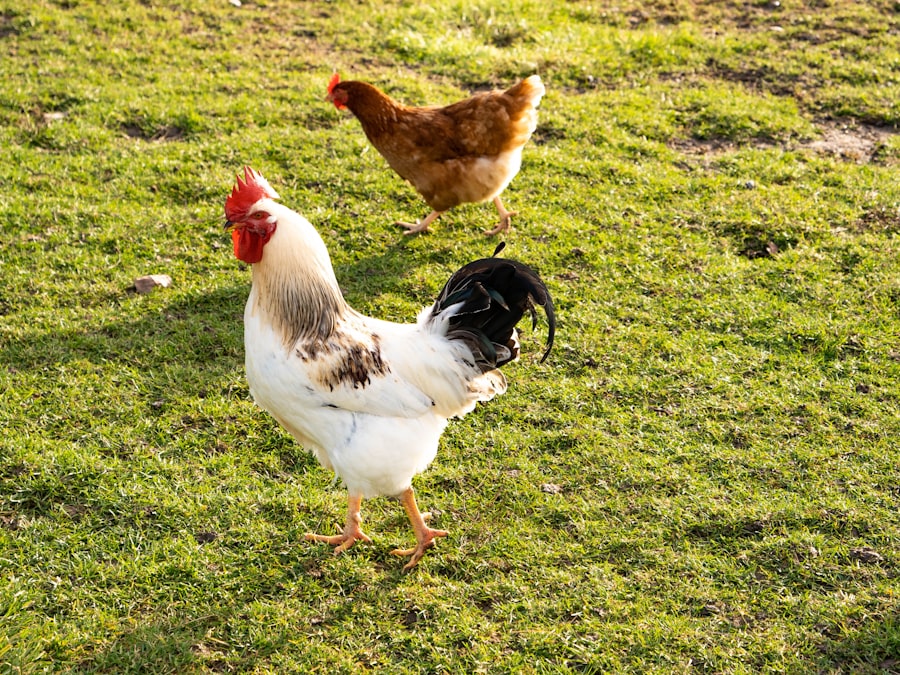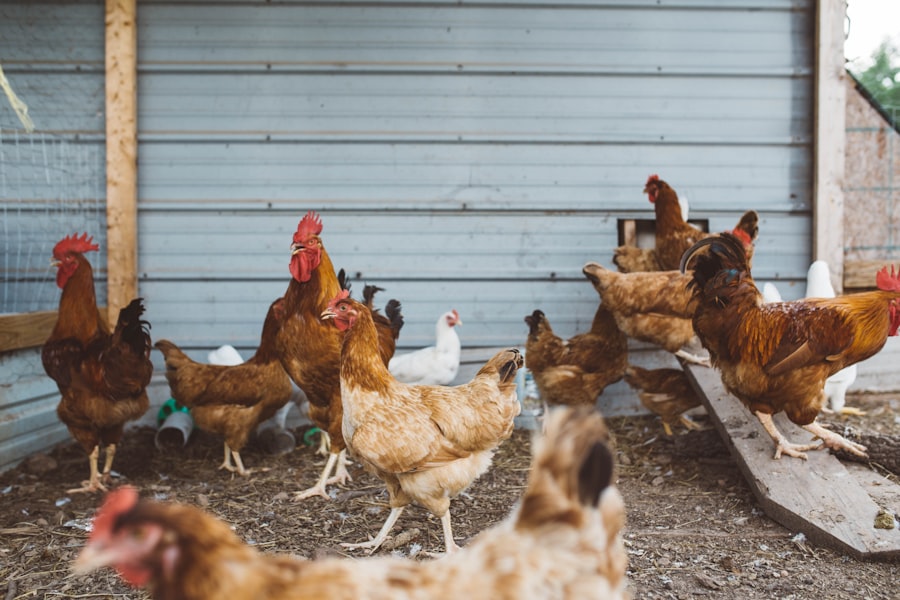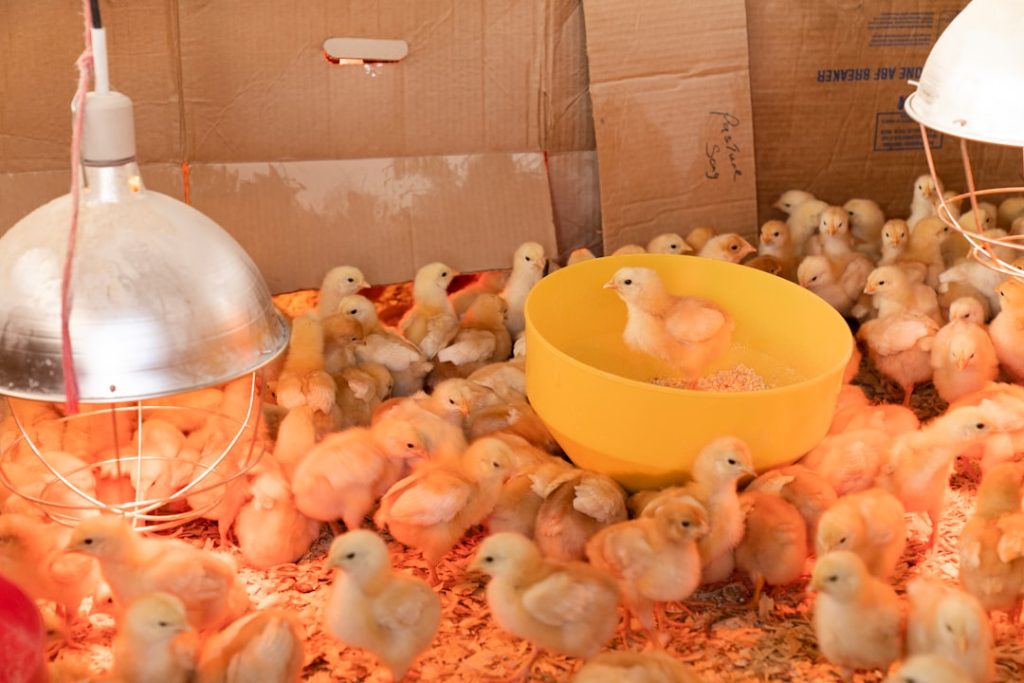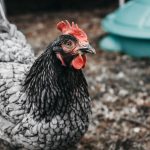Maintaining an active lifestyle is essential for the health and well-being of chickens. Regular exercise helps chickens maintain a healthy weight, promotes good circulation, and prevents boredom. Inactive chickens are more susceptible to obesity, which can lead to various health issues including heart problems, joint pain, and reduced egg production.
Active chickens are also less likely to display aggressive behaviors towards one another, as physical activity provides an outlet for their natural energy and instincts. Physical activity positively impacts chickens’ mental health as well. Chickens are naturally curious and social animals, and providing opportunities for exploration and environmental interaction helps prevent boredom and reduces stress.
Active chickens are more likely to engage in natural behaviors such as scratching, pecking, and dust bathing, which are crucial for their physical and mental well-being. Encouraging activity in chickens is vital for their overall quality of life. It allows them to express natural behaviors, maintain physical health, and experience mental stimulation.
By understanding and promoting the importance of keeping chickens active, caretakers can ensure these birds lead healthier and more fulfilling lives.
Table of Contents
- 1 Providing a Spacious and Stimulating Environment
- 2 Encouraging Natural Behaviors through Enrichment
- 3 Implementing Regular Exercise Opportunities
- 4 Offering a Varied and Nutritious Diet
- 5 Monitoring and Managing Stress Levels
- 6 Seeking Veterinary Care and Professional Advice
- 7 FAQs
- 7.1 What are some ways to keep chickens active?
- 7.2 Why is it important to keep chickens active?
- 7.3 What are some examples of toys and objects that can keep chickens active?
- 7.4 How much space do chickens need to stay active?
- 7.5 What are some ways to encourage chickens to forage for insects and plants?
Key Takeaways
- Keeping chickens active is important for their physical and mental well-being
- Providing a spacious and stimulating environment is crucial for the overall health of chickens
- Enrichment activities encourage natural behaviors and prevent boredom in chickens
- Regular exercise opportunities are essential for maintaining the fitness of chickens
- Offering a varied and nutritious diet is key to ensuring the health and productivity of chickens
- Monitoring and managing stress levels is important for the overall welfare of chickens
- Seeking veterinary care and professional advice is crucial for addressing any health concerns or issues with chickens
Providing a Spacious and Stimulating Environment
Space to Move and Engage in Natural Behaviors
Chickens need plenty of space to move around, stretch their wings, and engage in natural behaviors such as scratching and pecking. A crowded or confined environment can lead to stress, aggression, and decreased activity levels. Therefore, it is important to provide chickens with a coop and outdoor area that allows them to roam freely and explore their surroundings.
Creating a Stimulating Environment
In addition to space, it is also important to provide chickens with a stimulating environment that encourages activity. This can include adding perches, ramps, and platforms for chickens to climb on, as well as providing them with objects to peck at and explore. Creating a diverse and engaging environment can help prevent boredom and encourage natural behaviors.
Access to Fresh Air, Sunlight, and Natural Materials
Furthermore, providing chickens with access to fresh air, sunlight, and natural materials such as grass and soil can also promote activity and overall well-being. This can be achieved by providing a safe and secure outdoor area where chickens can roam freely and engage with their natural surroundings.
The Importance of a Spacious and Stimulating Environment
Providing a spacious and stimulating environment is crucial for keeping chickens active. By providing chickens with the space and stimulation they need, you can help prevent boredom, stress, and aggression, and promote overall health and well-being.
Encouraging Natural Behaviors through Enrichment

Encouraging natural behaviors through enrichment is another important aspect of keeping chickens active. Chickens have natural instincts such as scratching, pecking, dust bathing, and foraging for food. Providing them with opportunities to engage in these behaviors not only keeps them physically active but also promotes mental stimulation and overall well-being.
Enrichment activities can include scattering food for chickens to find, providing them with objects to peck at or scratch under, and creating areas for dust bathing. In addition to physical enrichment, it is also important to provide chickens with social enrichment. Chickens are social animals that thrive on interaction with their flock mates.
Providing them with opportunities to socialize, such as through group activities or access to outdoor areas where they can interact with each other, can help keep them active and engaged. Overall, encouraging natural behaviors through enrichment is essential for promoting activity and ensuring that chickens lead fulfilling lives. Encouraging natural behaviors through enrichment is crucial for keeping chickens active.
Chickens have natural instincts such as scratching, pecking, dust bathing, and foraging for food. Providing them with opportunities to engage in these behaviors not only keeps them physically active but also promotes mental stimulation and overall well-being. Enrichment activities can include scattering food for chickens to find, providing them with objects to peck at or scratch under, and creating areas for dust bathing.
In addition to physical enrichment, it is also important to provide chickens with social enrichment. Chickens are social animals that thrive on interaction with their flock mates. Providing them with opportunities to socialize, such as through group activities or access to outdoor areas where they can interact with each other, can help keep them active and engaged.
Overall, encouraging natural behaviors through enrichment is essential for promoting activity and ensuring that chickens lead fulfilling lives.
Implementing Regular Exercise Opportunities
Implementing regular exercise opportunities is essential for keeping chickens active. Just like any other animal, chickens need regular physical activity to maintain their health and prevent obesity. Providing them with opportunities for exercise can include allowing them access to outdoor areas where they can roam freely, providing them with objects to climb on or explore, or engaging them in activities such as foraging for food or playing with toys.
In addition to outdoor exercise opportunities, it is also important to provide chickens with indoor exercise options. This can include adding perches or platforms inside the coop for them to climb on or providing them with objects to peck at or interact with. By implementing regular exercise opportunities both indoors and outdoors, you can help ensure that your chickens stay active and healthy.
Implementing regular exercise opportunities is essential for keeping chickens active. Just like any other animal, chickens need regular physical activity to maintain their health and prevent obesity. Providing them with opportunities for exercise can include allowing them access to outdoor areas where they can roam freely, providing them with objects to climb on or explore, or engaging them in activities such as foraging for food or playing with toys.
In addition to outdoor exercise opportunities, it is also important to provide chickens with indoor exercise options. This can include adding perches or platforms inside the coop for them to climb on or providing them with objects to peck at or interact with. By implementing regular exercise opportunities both indoors and outdoors, you can help ensure that your chickens stay active and healthy.
Offering a Varied and Nutritious Diet
Offering a varied and nutritious diet is crucial for keeping chickens active and healthy. A balanced diet that includes a variety of nutrients is essential for supporting their overall well-being and energy levels. In addition to a high-quality commercial feed, it is important to supplement their diet with fresh fruits and vegetables, grains, seeds, and protein sources such as mealworms or insects.
Furthermore, offering a varied diet can also help prevent boredom and encourage natural foraging behaviors in chickens. Scatter feeding or providing food in different locations can stimulate their natural instincts to search for food, keeping them physically active while also providing mental stimulation. Overall, offering a varied and nutritious diet is essential for promoting activity and ensuring that your chickens receive the essential nutrients they need to thrive.
Offering a varied and nutritious diet is crucial for keeping chickens active and healthy. A balanced diet that includes a variety of nutrients is essential for supporting their overall well-being and energy levels. In addition to a high-quality commercial feed, it is important to supplement their diet with fresh fruits and vegetables, grains, seeds, and protein sources such as mealworms or insects.
Furthermore, offering a varied diet can also help prevent boredom and encourage natural foraging behaviors in chickens. Scatter feeding or providing food in different locations can stimulate their natural instincts to search for food, keeping them physically active while also providing mental stimulation. Overall, offering a varied and nutritious diet is essential for promoting activity and ensuring that your chickens receive the essential nutrients they need to thrive.
Monitoring and Managing Stress Levels

Common Stressors for Chickens
Common stressors for chickens include overcrowding, changes in their environment or routine, predator threats, or illness.
Monitoring Stress Levels in Your Flock
To monitor stress levels in your flock, it is important to observe their behavior regularly for signs of distress such as decreased activity, changes in eating or drinking habits, or aggressive behaviors towards other flock members.
Managing Stress in Your Flock
If you notice any signs of stress in your flock, it is important to identify the cause of the stress and take steps to manage it effectively. This may include providing more space or hiding spots in the coop, reducing noise or disturbances in their environment, or addressing any health issues promptly.
Seeking Veterinary Care and Professional Advice
Seeking veterinary care and professional advice is essential for maintaining the health and activity levels of your chickens. Regular check-ups by a qualified avian veterinarian can help identify any health issues early on before they impact your flock’s activity levels or overall well-being. Additionally, if you notice any changes in your chicken’s behavior or activity levels that are concerning, seeking professional advice can help identify the underlying cause of the issue.
In addition to veterinary care, seeking advice from experienced poultry keepers or professionals can provide valuable insights into maintaining the activity levels of your flock. They may be able to offer guidance on environmental enrichment strategies or dietary adjustments that can help promote activity in your chickens. Overall, seeking veterinary care and professional advice is essential for ensuring that your flock remains healthy and active.
Seeking veterinary care and professional advice is essential for maintaining the health and activity levels of your chickens. Regular check-ups by a qualified avian veterinarian can help identify any health issues early on before they impact your flock’s activity levels or overall well-being. Additionally, if you notice any changes in your chicken’s behavior or activity levels that are concerning, seeking professional advice can help identify the underlying cause of the issue.
In addition to veterinary care, seeking advice from experienced poultry keepers or professionals can provide valuable insights into maintaining the activity levels of your flock. They may be able to offer guidance on environmental enrichment strategies or dietary adjustments that can help promote activity in your chickens. Overall, seeking veterinary care and professional advice is essential for ensuring that your flock remains healthy and active.
In conclusion, Keeping chickens active is crucial for their overall health and well-being. Providing them with a spacious and stimulating environment that encourages natural behaviors through enrichment activities is essential for promoting activity levels in your flock. Implementing regular exercise opportunities both indoors and outdoors can help ensure that your chickens stay physically active while offering a varied and nutritious diet supports their energy levels.
Monitoring stress levels in your flock is crucial for maintaining their activity levels while seeking veterinary care and professional advice when needed ensures that any health issues are addressed promptly. By understanding the importance of keeping chickens active and taking proactive steps to promote their physical activity levels through environmental enrichment strategies, regular exercise opportunities, varied diets, stress management techniques, you can help ensure that your flock leads happy and healthy lives.
If you’re looking for ways to keep your chickens active, you may also be interested in learning about what geese can eat. Check out this article on poultrywizard.com to find out more about feeding geese and how it relates to keeping your poultry active and healthy.
FAQs
What are some ways to keep chickens active?
Some ways to keep chickens active include providing them with ample space to roam, offering a variety of toys and objects for them to peck at and explore, and allowing them to forage for insects and plants.
Why is it important to keep chickens active?
Keeping chickens active is important for their physical and mental well-being. It helps prevent boredom, reduces stress, and promotes overall health and happiness.
What are some examples of toys and objects that can keep chickens active?
Examples of toys and objects that can keep chickens active include hanging treats, mirrors, perches, and objects for pecking and scratching such as cabbage or a hanging head of lettuce.
How much space do chickens need to stay active?
Chickens need a minimum of 2-3 square feet of space per bird in the coop, and at least 8-10 square feet of outdoor space per bird for them to stay active and healthy.
What are some ways to encourage chickens to forage for insects and plants?
To encourage chickens to forage for insects and plants, you can provide them with access to a large outdoor area with grass, shrubs, and trees, and scatter treats and food around the area to encourage natural foraging behavior.
Meet Walter, the feathered-friend fanatic of Florida! Nestled in the sunshine state, Walter struts through life with his feathered companions, clucking his way to happiness. With a coop that’s fancier than a five-star hotel, he’s the Don Juan of the chicken world. When he’s not teaching his hens to do the cha-cha, you’ll find him in a heated debate with his prized rooster, Sir Clucks-a-Lot. Walter’s poultry passion is no yolk; he’s the sunny-side-up guy you never knew you needed in your flock of friends!







